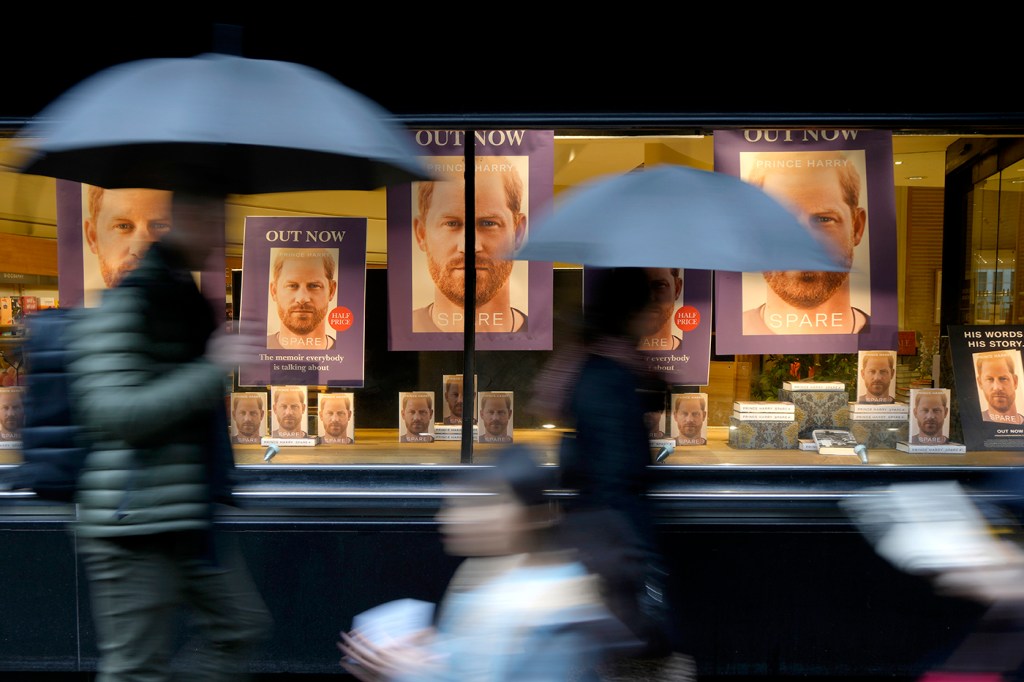Prince Harry’s ‘Spare,’ like most celebrity memoirs, was ghostwritten. Is it any less authentic?

Prince Harry’s long-anticipated memoir, “Spare,” is here. The tell-all, which CNN says “rips open old wounds” in the royal family, comes at a time when interest in the British monarchy couldn’t be higher—arguably, for many of the reasons spelled out in the book.
Harry’s memoir was ghostwritten by J.R. Moehringer, who helped produce Andre Agassi’s best-selling memoir, “Open,” about the tennis star’s struggles with fame and the pressures of achievement.
The two books bear a similar design: an intimate close-up of its subject, looking stoic—a portrait of untold grief overshadowed by celebrity.
“Spare” is just the latest ghostwritten work to be received by eager readers across the world. Moehringer, whose own memoir, “The Tender Bar,” was highly acclaimed, is credited with helping cultivate the former royal’s voice on the page, conferring authenticity through a collaborative process that’s become a standard in the publishing of celebrity non-fiction.
There have been countless celebrity memoirs published in recent years by a handful of influential ghostwriters. Has the practice diminished the value of these mass market works?
“A pervasive myth about ghostwriting is that the resultant book may be less authentic than a self-authored work,” says Claire Griffiths, associate head of creative writing at Northeastern University London.
Griffiths says a skilled ghostwriter typically conducts “high-level research” into their subject, fleshing out in-depth reflections through multiple interviews and frequent conversations. In addition to having to embody their subject’s voice, ghostwriters must shape that interview material into something “engaging, accessible and representative for readers.”
“Of course, there are good and bad ghostwriters, subjects with varying agendas or narratives to promote, and even quality ghostwriting can’t mitigate the layers of editorial, legal and marketing adjustments a work may go through pre-publication, which may sanitize the content,” she says. “And nor does this exempt such works from valid questions about authorship and authenticity.”
“Spare” reveals in tragic detail some of the hardships Harry faced while a senior member of the royal family, beginning with the death of his mother, princess Diana, in 1997. Since stepping back from his role and moving to the U.S., the Duke of Sussex and his wife, Meghan Markle, have been making headlines for their part in a growing family rift—one that’s captivated a Transatlantic public, and raised questions about the pieties of old-world aristocracy and tradition at a time when social justice, race and inequality have dominated public conversation.
Amid competing media narratives that pit Harry’s travails against his critics, who claim he and Markle are “cashing in,” many have spurned the new release; others describe it as moving, sensitive—lauding the couples’ defiance of the “never complain, never explain” M.O. of the royal family.
But there’s been little conversation about “authorship and authenticity” as it pertains to “Spare,” which is notable given that Harry intended the book to be a firsthand account of his experience as a member of the royal family—a way to counter the anonymously sourced gossip he claims his family and the British press have weaponized against him and Markle. As a result, the memoir as a literary mode centered around authenticity, trust and intimacy, may take even more importance to readers who care about the royal family.
“Every word in that book is mine,” Harry told Stephen Colbert on the “Late Show” this week. “Instead of hiding behind unnamed sources … these are my words from my lips, from my mouth.”
They are, no doubt, Harry’s words; but to what extent are they also Moehringer’s? Tomas Elliott, assistant professor in English at Northeastern University London, says that no book or text offers “unmediated access” to the contents of its author, citing the exhaustive editorial processes works are subjected to, and the blurring of author and “speaker” that characterizes works of many genres.
Even though “Spare” was technically ghostwritten, it is no less authentic, in this way.
“All texts, from the fictional to the non-fictional, and from the personal to the impersonal (and everything on that spectrum), are constructed and artificially organized,” he says. “There is never a clear mapping of the ‘I’ who speaks in a memoir/autobiography to the ‘I’ of the author who appears on the cover.”
“As such, I wouldn’t say that any one form of memoir-writing is any more ‘valuable’ or ‘authentic’ than any other,” Elliott adds, “they all simply come with different considerations, alerting us to the layers of mediation that go into the construction of any kind of narrative.”
Griffiths says there’s been a cultural shift over the last decade or so in the public acknowledgment of ghostwriters, “something Harry and his publishers appear to be aware of.” As a professional practice, she says ghostwriting is now an “established genre, fertile territory for writers, and … certainly here to stay.”
And it’s a practice that’s age-old—as old as civilization itself.
“It’s also not a new phenomenon, having origins that have been traced to the fifth century B.C., when—interestingly, given the current conversation about Harry’s memoir—official scribes wrote on behalf of royalty,” Griffiths says.
“[Ghostwriting] does seem to have become much more common in the [20th and 21st] centuries, though, which have coincided with the rise of modern celebrity culture,” Elliott says. “This has been coterminous with the development of Hollywood and, more recently, with the specific idea of celebrities as being people who are ‘just like you and me.’”
This, in turn, Elliott says, is linked to the rise of tabloid newspapers, “and the talk shows in the ‘90s and early 2000s, as well as with modern social media.”
Tanner Stening is a Northeastern Global News reporter. Email him at t.stening@northeastern.edu. Follow him on Twitter @tstening90.






